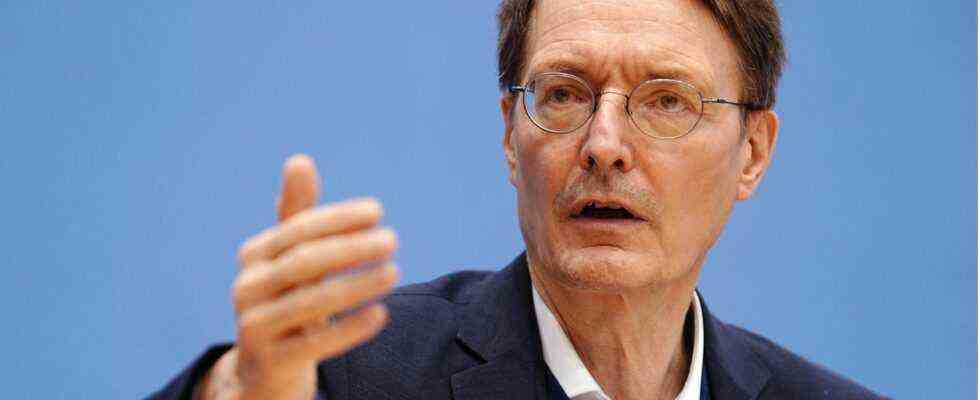omicron wave
Because they have become scarce: Lauterbach wants to ration PCR tests
Karl Lauterbach reacts to the scarce resources for the PCR tests: He wants to significantly limit the use and focus on certain people.
© Kay Nietfeld / Picture Alliance
During the current omicron wave, there are too few PCR tests. Health Minister Lauterbach therefore wants only certain groups to receive such tests. The management of the pandemic is also to be changed.
The Omicron wave currently has Germany under control. Before new federal and state consultations on the corona situation, Federal Minister of Health Karl Lauterbach advocates maintaining the existing measures by and large. The SPD politician opposed tightening in the “Rheinische Post” – at the same time he warned: “But a relaxation would be fatal. We would pour oil on the fire and accelerate the wave.”
In view of the rapidly increasing number of infections, however, Lauterbach proposes prioritizing the particularly accurate PCR tests and concentrating contact tracing on certain professional groups.
The minister wants that in many cases in the future a positive rapid test will not be followed by a PCR test. “My proposal for the Prime Ministers’ Conference provides that in future only employees of critical infrastructure can have a positive rapid test confirmed with a PCR test,” he said. All others who, for example, had a positive rapid test at home should only have this confirmed in the test center with a “professional rapid antigen test”.
Advice on Corona and PCR tests this weekend
Chancellor Olaf Scholz and the prime ministers of the federal states will discuss the situation on Monday. The health ministers are already talking about how to proceed this Saturday, including the PCR tests.
The focus is on dealing with the omicron virus variant, which is currently also spreading rapidly in Germany. Lauterbach expects several hundred thousand new infections per day in mid-February. Omikron tends to be associated with milder courses than the Delta variant. However, there are fears that very high case numbers and massive staff shortages could nevertheless put a strain on the health system and important care areas.
Therefore, the government wants to change the management of the pandemic. Lauterbach had already announced that it would present a proposal for prioritizing the tight PCR tests this weekend. A draft ordinance as of Tuesday afternoon provided for “a priority diagnosis of sample material from employees who have contact with particularly vulnerable groups of people”.
Karl Lauterbach wants to save capacity at the “peak of the wave”.
The minister argued in the “Rheinische Post” that the probability that the PCR test would show a different result than a professional antigen test was “very low given the high prevalence of the omicron variant”. The quick test result also goes to the health department. “The PCR test is no longer a prerequisite for reporting to the RKI. This saves us important PCR capacities for the peak of the wave.”
The German Association of General Practitioners advocates using the PCR tests less frequently. “I welcome it if PCR tests no longer have to be carried out to confirm every antigen test in the future – especially if the test capacities are now running out,” said Chairman Ulrich Weigeldt of the editorial network Germany (RND). “Medically, it doesn’t make sense to have to do a PCR test after a positive antigen test and clear symptoms.”
The patient advocate Eugen Brysch called for corona risk groups to be prioritized in the PCR tests. “The very old, those in need of care, the seriously ill and their relatives must come first in the PCR test,” said the board of directors of the German Foundation for Patient Protection of the “Neue Osnabrücker Zeitung”. The core of all pandemic measures is the protection of the most vulnerable people. “Now giving priority to professional groups in laboratory tests cannot do justice to this social claim.”
In order to track the contacts of infected people, Lauterbach said with a view to the expected high number of cases: “No health department will be able to process this anymore, not even with the help of the Bundeswehr. We therefore need a focus on contact tracing as soon as possible, for example with teachers, medical staff, employees from energy and water suppliers, emergency services and other areas of critical infrastructure.”
With regard to the corona measures, voices have already come from the states to refrain from new, tougher restrictions – for example from Bavaria’s Prime Minister Markus Söder (CSU). He said on Friday that on the other hand there was no reason to completely dispense with corona management, as in Great Britain. However, depending on the situation, there could be some relief. Lower Saxony’s Prime Minister Stephan Weil (SPD) told the German Press Agency: “It is not the time for easing, but tightening is not indicated either.”
Calls for easing the pandemic are getting louder
Federal Minister of Justice Marco Buschmann (FDP) linked the withdrawal of corona restrictions to the course of the omicron wave: “If the next few weeks show that omicron can be controlled and can be combated with milder means, measures must be withdrawn,” he said. New Osnabrück newspaper”. “The whole truth is that there are models that predict a heavy burden on hospitals during February.” You have to “keep a close eye on the situation”.
“By the beginning of February at the latest, it will be very tight in hospitals across Germany if the number of infections continues to rise at this rate,” said the chairwoman of the Marburger Bund medical organization, Susanne Johna, to the newspapers of the Funke media group. It’s not just about growing patient numbers. “We expect that in the coming weeks a large number of medical and nursing staff will be absent because they have become infected and have to isolate themselves.”

Ssee the video: Is vaccination coming? In an interview with RTL, Federal Health Minister Karl Lauterbach answered various questions about the omicron wave and a possible vaccination requirement in Germany.

